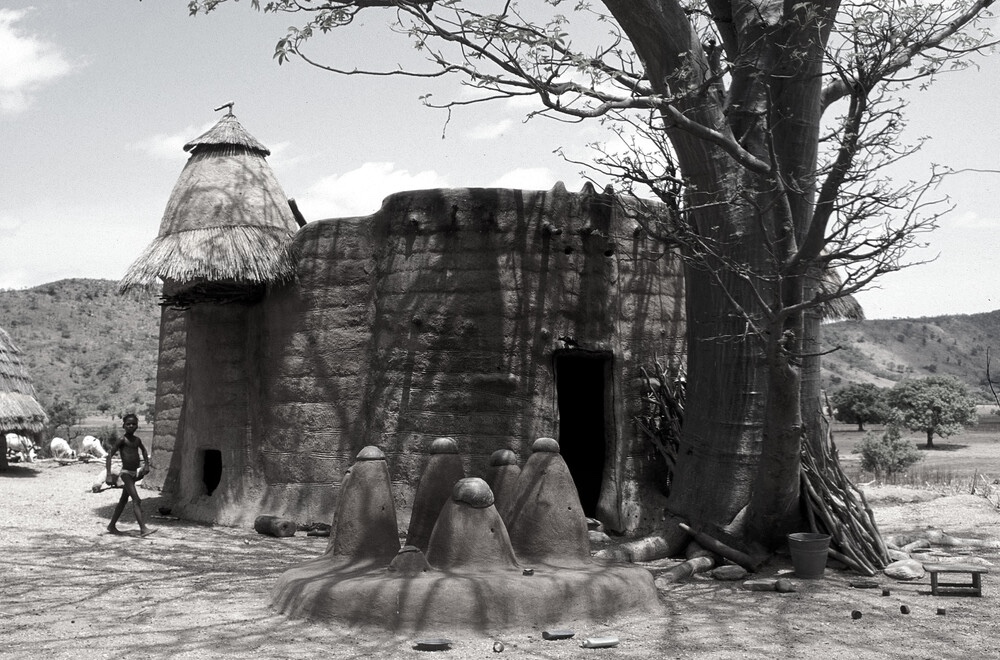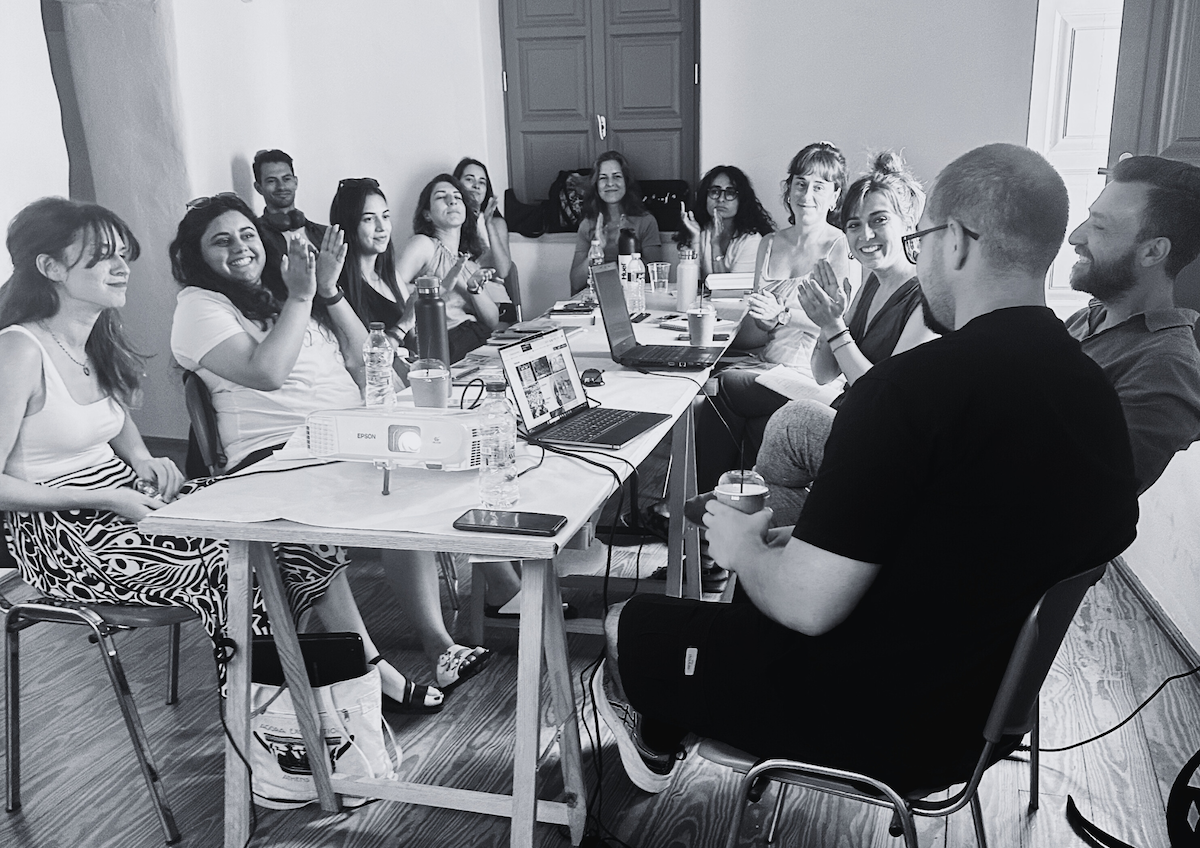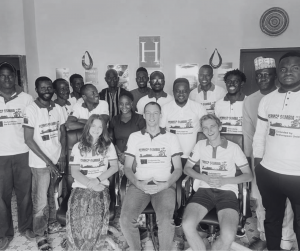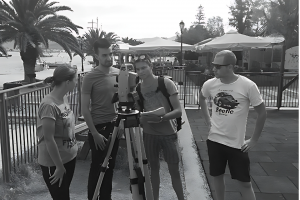Tag Archives: Digital Tools
What Future for Sacred Places in the Age of Climate and Virtuality?
By Ibrahim Tchan,
Climate change does not only erode landscapes or materials. It threatens gestures, rituals, stories—what binds people to their territories, to their ancestors, to their sense of belonging. In the face of this, should we simply document, archive, observe the loss? Or should we begin to invent new forms of presence, capable of extending the breath of heritage where the ground becomes unstable, practices disperse, and memory fades?
This is exactly the path we are currently walking with the Takienta, the ritual dwelling of the Batammariba people, in the Koutammakou region (Benin/Togo).
We are actively engaging in a multi-layered process using virtual reality, 3D modeling, photogrammetry, telepresence, augmented reality, and now drone-assisted AI for inventory and sacred landscape mapping.
But our aim is not to freeze this living architecture in pixels. It is to make it accessible in new ways, to enable active transmission, especially where collapsing soils, displacement, or disrupted rhythms make ritual continuity difficult.
We are working to ensure that initiation rituals like the Dikuntri (for girls) and the Difuani (for boys) can still be felt, understood, and experienced—even remotely, even tomorrow—in a world where physical presence may no longer be possible, but where spiritual connection can be reimagined. This is no longer just about preserving form, but about ensuring that communities—especially younger generations—can continue to “inhabit” their heritage, making it a living resource in an uncertain world.
This approach raises critical questions:
➡ How can digital tools become instruments of cultural adaptation, not substitution?
➡ What ethical, inclusive, and grounded models can guide us in this transition?
➡ Which stories, practices, and examples should we be sharing—urgently?
We offer this not as a finished solution, but as an open invitation to explore, test, and co-create. To engage in cross-disciplinary collaboration, to rethink how we care for what matters most. Because heritage does not preserve itself. It must be carried, transformed, retold—together. And if the tools of tomorrow can help honor the memory of our origins, then it is up to us to use them with care, clarity… and commitment.
*Ibrahim Tchan is a Heritage and Climate Change Specialist Researcher/Project Manager working in Benin
HERITΛGE in the News
Our teams are working around the world to fulfill the HERITΛGE mission. Here is how some of our work has been featured in the press in the last few months.
Heritage Threatened by Conflict
HERITΛGE has launched a new project to safeguard Ukraine’s cultural heritage. Architectural Heritage Preservation in Times of War: The Ukrainian Model is being realized in cooperation with the Kharkiv School of Architecture and Skeiron, with generous support from the U.S. Embassy’s Public Diplomacy Section in Ukraine. The project has been featured in the latest issue of Popular Archaeology as well as in Ukrainian media.
HerMaP Gambia
The Gambia’s National Assembly’s Committee for Culture and Tourism recently embarked on a Parliamentary Study Tour in Thessaloniki. This visit, conducted as part of the HerMaP Gambia program co-funded by the European Union, was widely covered in the Gambian media, including prominent news programs and The Voice newspaper.
Watch the QTV bulletin (start at 14:18) or read the article in The Voice.
HERITΛGE also delivered workshops in The Gambia on various aspects of cultural management, including Festival Management, which was covered by The Voice.
African Heritage Grants
HERITΛGE’s small grants for African heritage initiative, supported by the Mellon Foundation, recently funded Restoring Ilukwe House, a project by the NGO Legacy to restore a historic building in Lagos’ railway compound. Coverage of this initiative appeared in Nigeria’s The Guardian.
The Republic, a Nigeria-based magazine and platform of socio-economic and political commentary, criticism and cultural discourse, has received a substantial grant from the Mellon Foundation to support its mission to establish itself as a regional, leading hub/platform for Black and Africa-focused ideas and critical perspectives; and to further connect Africa and the African diaspora on critical issues, with the help of HERITΛGE.
Greek Living Heritage Network
As a founding member of the Living Heritage Network in Greece, HERITΛGE continues to support and celebrate Greece’s living heritage. Theodosia Maroutsi recently discussed the Network on NaMaste, a cultural program on Greece’s national broadcaster ERA2.
Greek speakers can listen to the show here.
New dates for HERITΛGE summer field schools 2025
HERITΛGE is pleased to announce new dates for our 2025 summer schools. The HERITΛGE summer schools are excellent opportunities for heritage professionals and students to develop existing knowledge and learn new skills for managing heritage. Applicants do not have to have previous experience in the particular field of study and we welcome students eager to improve their understanding in new areas of heritage. Places are limited so we recommend applying soon!
HERITΛGE is offering two programmes for 2025:
Engaging Communities in Cultural Heritage
Date: 16 June – 6 July 2025
Location: Paros, Greece (in person and online)
Language: English
Lecturers: Dr Aris Anagnostopoulos and Dr Lena Stefanou alongside guest lecturers, Dr
Evangelos Kyriakidis and Vicky Papadimitriou
This hybrid programme aims to develop a different approach to community engagement that is based on social and artistic research with community-led initiatives. Through meetings, assignments and fieldwork, students will be introduced to the principles of community engagement and learn how these can be applied in different circumstances, appropriately addressing cultural differences within the field. The duration of the course is two weeks, with five three-hour meetings. Fieldwork will take place on the island of Paros, in Greece.
I applied to this workshop to improve my fieldwork methodology, and I found it greatly helped
me develop because I was able to learn about those details that we cannot learn without
going into the field and starting to work. It has really helpful for me on how to conduct my
research questions and how to engage with the people I am interviewing. (Elif Aydin, a PhD
Candidate at Istanbul Technical University. Engaging Communities in Cultural Heritage,
2024)
Click here for more information and how to apply.
Digital Tools for Cultural Heritage Management
Date: 13 May-17 June 2024 (applications now open)
Location: Nafplio, Greece (in person and online)
Language: English
Lecturer: Dr Cornelis Stal
HERITΛGE have collaborated with HOGENT University (Belgium) to deliver three integrated and consecutive specialist courses in geomatic topic. These courses will cover GIS, Photogrammetry and image-based 3D modelling, and Terrestrial laser scanning*. Students will be provided with hands-on instruction, hands-on demos and exercises in each. Skills taught will help heritage professionals in restoration, documentation, or visualization projects specifically but can be applied to a range of other fields.
*Please note that these specialist courses can be booked individually. For those intending to just do sections of the field summer school, please contact at the email [email protected] for further information and arrangements.
I decided to take the course because I think it could be very useful in my work both for documenting for the future, using it for planning in daily work with managing heritage buildings. Also to make available on the internet for people who are not able to visit in person.(Helen Myhr Radell, Project Leader, Stiftelsen Skansen. Digital Tools for Cultural Heritage Management, 2024)
It was amazing, moving from place to place from old archaeological sites to old church photogrammetry and dealing with all this senior equipment like drones, laser scanning. Processing all this data gives you fuller information and the full picture about the process so you will then be able to it by yourself! (Khaled Hiatlih, Co-founder Heritage Roots. Digital Tools for Cultural Heritage Management, 2024)
Click here for more information and how to apply:
This course is supported by Metashape.
Digitizing Gambia’s Heritage: A workshop in Digital Tools for Cultural Heritage
HERITΛGE is pleased to announce the successful completion of a transformative workshop that trained heritage caretakers in The Gambia on the latest digital tools for cultural heritage management. Our “Digital Tools for Heritage Management” workshop took place in Barra, Gambia, from December 12th to 18th, 2023. It is part of the HerMaP Gambia program, co-funded by the European Union and implemented by HERITΛGE.
Led by HERITΛGE’s and HOGENT University’s Dr. Cornelis Stal, the week-long event was attended by 14 representatives from various leading heritage institutions in the country, including the National Center for Arts and Culture (NCAC), the National Environment Agency (NEA), ITTOG (The Institute of Tourism and Travel of The Gambia), the Gambia Youth Chamber of Commerce (GYCC), the Juffureh & Albreda Youth Society (JAYS), CityWide Ventures International, and community members from Barra.
“I am genuinely delighted by the wholehearted enthusiasm with which the participants immersed themselves in this innovative workshop,” said Mina Morou, Africa Programs Manager at HERITΛGE and Project Manager for HerMaP Gambia. “The culmination of the participants’ efforts resulted in the impressive 3D modeling of two significant heritage sites, Fort Bullen and Kuntah Kinteh Island, a testament to the success of the workshop in translating theoretical concepts into practical and valuable outcomes.”
Dr. Stal, assisted by two students from HOGENT University, laid the foundation for an enriching learning experience. Participants were introduced to a broad range of 3D recording and mapping techniques, as well as methodologies to use and analyze spatial data. Geographic Information Systems were utilized to acquire, manage, and integrate spatial data for management and analysis purposes, and to publish the resulting data in cartographic deliverables for Fort Bullen and Kuntah Kinteh Island. The video forms part of the 3D modeling of Fort Bullen.
The initial three days focused on GIS fundamentals, 3D recording, and mapping techniques. The subsequent three days delved into theoretical training in photogrammetry, image-based 3D modeling, camera models, optics, and data processing. Following this, participants applied their knowledge practically to heritage sites.
“Many thanks to The Heritage Management Organization and HerMaP Gambia for bringing digital technology to Gambian heritage,” said Hassoum Ceesay, Director General of NCAC.
Develop your heritage management expertise with HERITΛGE’s cutting-edge Summer Field Schools
Develop your heritage management expertise: gain new skills and embrace best practices with HERITΛGE’s cutting-edge Summer Field Schools
HERITΛGE is thrilled to announce we are now accepting applications for our upcoming Summer Field Schools, offering exceptional opportunities for cultural heritage professionals. These intensive programs delve into crucial aspects of heritage management, providing participants with hands-on experience and cutting-edge knowledge in two key areas: Digital Tools for Cultural Heritage and Engaging Communities for Cultural Heritage.
Digital Tools for Cultural Heritage Summer School: Unlock the Power of Digital Tools in Heritage Management
In the ever-evolving landscape of heritage management, digital tools play a pivotal role. HERITΛGE, in collaboration with HOGENT, presents a unique summer school program focusing on the acquisition, processing, management, and analysis of spatial data. This program introduces participants to three specialized courses:
- GIS (Geographic Information Systems)
- Photogrammetry and Image-based 3D Modeling
- Terrestrial Laser Scanning
Theoretical aspects will be delivered online, allowing for flexibility, while on-site tasks will provide practical, hands-on experience. For those able to travel to Greece, an exciting opportunity awaits to practice Photogrammetry and Laser Scanning in the field with in-person support from instructors. The program, organized in collaboration with the municipality of Nafplio, Greece, aims to document historically significant structures, serving as the educational arm of the HERITΛGE research project.
Engaging Communities for Cultural Heritage Summer School:Redefining Community Engagement in Heritage Management
Community engagement is at the forefront of heritage institutions worldwide. HERITΛGE’s hybrid program focuses on community-led initiatives, social and artistic research, and practical exercises. Collaborating with local festivals and initiatives on the Greek island of Paros, this program offers a dynamic approach to community engagement. Participants, whether online or in person, will explore ethnography, oral history, and multimedia content creation, contributing to research and the preservation of local heritage.
Why Choose Heritage Management Organization’s Summer Field Schools?
Tailored Learning: Programs cater to both beginners and professionals, providing a platform for skill development and research.
Expert Collaboration: Collaborate with experts from renowned partners.
Real-world Experience: Engage in practical exercises, fieldwork, and community-led initiatives to apply theoretical knowledge.
Global Impact: Contribute to larger research projects, shaping the future of heritage management worldwide.
How to Apply:
For those eager to embark on this transformative journey, applications are now open. Visit our website for more information and to secure your spot in these exciting summer field schools.
Whether you’re interested in digital tools or community engagement, HERITΛGE invites you to explore, learn, and contribute to the preservation of cultural heritage.
Join us this summer and be part of an international community dedicated to shaping the future of heritage management!
Europe’s Common Data Space for Cultural Heritage
By Rob Davies
The European Strategy for data focuses on putting people first in developing technology and defending and promoting European values and rights in the digital world. Data is seen as an essential resource for economic growth, competitiveness, innovation, job creation and societal progress in general. The aim is to create a single market for data that will ensure Europe’s global competitiveness and data sovereignty.
Common European data spaces will be developed and funded in key strategy sectors and areas of public interest, such as health, agriculture or manufacturing. They are intended to ensure that more data becomes available for use in the economy and society, while keeping the companies and individuals who generate the data in control. Data driven applications will benefit citizens and businesses in many ways such as improved health care, safer and cleaner transport systems, lower cost public services, improved sustainability and energy efficiency, more business innovation and by generating new products and services.
The plan is to adopt legislative measures on data governance, access and reuse, e.g. for business-to-government data sharing for the public interest. And to make data more widely available by opening up high value publicly held datasets across the EU and allowing their reuse for free. A big investment in data processing infrastructures, data sharing tools, architectures and governance mechanisms. Thriving data sharing and federated energy-efficient and trustworthy cloud infrastructures and related services.
Among the 14 data spaces initially envisaged, The European Commission has published a recommendation on a common European data space for cultural heritage. The aim is to accelerate the digitisation of cultural heritage assets like cultural heritage monuments and sites, objects and artefacts for future generations, to protect and preserve those at risk, and boost their reuse in domains such as education, sustainable tourism and cultural creative sectors.
Currently cultural tourism represents up to 40% of all tourism in Europe, cultural and creative industries contribute 3.95% of total EU value added (€477 billion) and more than 8 million people are employed within them, through 1.2 million firms – 99.9% of which are SMEs; Member States are encouraged to digitise by 2030 all monuments and sites that are at risk of degradation and half of those highly frequented by tourists. This will contribute to the objectives of the Digital Decade by fostering a secure and sustainable digital infrastructure, digital skills and uptake of technologies by businesses, in particular SMEs.
Europeana, the European digital cultural platform, will be at the basis for building the common data space for cultural heritage by allowing museums, galleries, libraries and archives across Europe to share and reuse the digitised cultural heritage images such as 3D models of historical sites and high quality scans of paintings. Europeana currently offers access to 52 million cultural heritage assets, 45% of which can be reused in various sectors. Images and text make up 97.5% of Europeana’s assets, with only 2.47% audiovisual content and 0.03% in 3D. The collection of 3D assets in particular should see a massive boost, thanks to this latest initiative.
It is envisaged that the common data space for cultural heritage will include a wider variety of data types than the current digital content of Europeana. While these are still to be fully defined, they might be about any aspect of tangible or intangible Cultural Heritage – its creation, description, storage, presentation/performance, transmission, access, preservation, reuse, rights etc.- or possibly even more widely drawn from across the whole spectrum of cultural activity, including data coming from scientific or other fields which eventually constitutes our heritage.
Alongside this, the European collaborative cloud on cultural heritage (ECCCH) is a European Union initiative for a digital infrastructure that will connect cultural heritage institutions and professionals across the EU. It is intended to help protect European cultural heritage while answering to the new requirements of a digitized world. In doing that, it will provide practical benefits to all cultural heritage professionals and museums, developing specific digital collaborative tools for the sector while removing barriers for smaller and remote institutions. The goal is to help cultural heritage institutions, research organisations and other professionals of all sizes and types work with their digital objects in a more visible, interconnected, harmonised, and informed way, allowing them to successfully cope with the challenges the digital transition poses to the sector.
The ECCCH, funded by Horizon Europe, will aim to add a new digital dimension to cultural heritage preservation, conservation, restoration and enhancement by providing cutting-edge technologies for digitising artefacts and researching artworks, paving the way for new transdisciplinary collaboration in the field of cultural heritage, bringing together specialists from a range of disciplines, including scholars, curators, archivists, and conservators.
This ambitious project for a new cutting-edge platform will work in tandem with other European initiatives, such as Europeana and the common European dataspace for cultural heritage, to add a new dimension to the way we approach, conserve and enhance our shared cultural heritage. As part of the ECCCH, two calls for proposals were open until September 2023 to fund. projects which will contribute to setting up the foundations of ECCCH. With an envisaged budget of €110 million until 2025 from Horizon Europe, the ECCCH will be a unique infrastructure that will enable unprecedented transdisciplinary and large-scale collaboration between specialists.
*Rob Davies is HERITΛGE’s Head of European Programs and Chair of the Management Board of the Europeana Network Association (ENA).
*HERITΛGE offers a number of training opportunities on Digital Tools for Cultural Heritage. These include a 3-day workshop, a summer field school, and a credit bearing Certificate in cooperation with HOGENT University.







